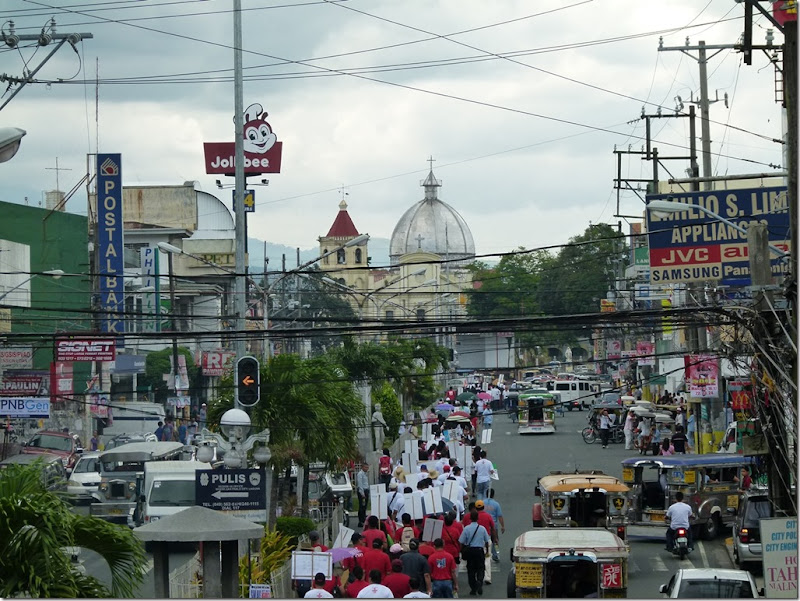 MANILA: "America The Beautiful" versus "America The Beautiful" - how do you like that?! Here is the short story of the rise of the individual and the fall of the social in the United States of America. A largely untold story.
MANILA: "America The Beautiful" versus "America The Beautiful" - how do you like that?! Here is the short story of the rise of the individual and the fall of the social in the United States of America. A largely untold story.
Through forwarded email has come to me the poem written by American Judge Roy Moore entitled "America The Beautiful" (I'm reprinting it in full below, as a footnote[1]). I Filipino am awed by the poet's creative expression, the originality of thought, and the courage to proclaim his belief in the Christian God despite the God Denial by Americans in their government offices and public schools.
If you're not American, or if you didn't know anyway, Katharine Lee Bates' original poem "America The Beautiful" (original published in 1895, Wikipedia), after 100 years inspired the original poem "America The Beautiful" by Judge Moore (circulating in the Internet via email since 1997, urbanlegends.about.com). Only the titles are the same; the latter is a parody of the former. Bates' poem has become an unofficial US national anthem; as for Moore's poem, I will not be surprised when someone puts it to music and it becomes a national anthem for those who, like me, see this:
There is no moral separation between Church and State.
Judge Roy Moore's story is one of a battle between Church and State, and where faith won over fact. It's a story of Law and Order - Man's Law and God's Order.
This one began when Moore was removed from office in 2003 by a federal judge when he refused the order to remove a 5,200-pound granite Ten Commandments monument that he himself envisioned, enshrined and exposed at the lobby of the Alabama Judicial Building (Dave Bohon, 07 November 2012, thenewamerican.com). The judge then became a Condemned Man for years and years.
But this loser never quit!
Late last year, Moore won back the seat he was ousted from almost a decade ago, being Chief Justice of Alabama (Kim Chandler, 09 November 2012, huffingtonpost.com). On winning, Moore promised not to return the monument because, he says, the issue was never the monument. "The true issue is whether we can acknowledge the sovereignty of almighty God over the affairs of our state and our law," Moore said. "That I will not back down from. I will always acknowledge the sovereignty of God and I think we must." Moore's poem does exactly that.
I love poetry; I love the English language; I am indebted to the Americans for bringing this language to the Philippines. Judge Moore's is simple poetry, and yet I find it beautiful. Beauty is in the eye of the beholden.
AMERICA THE BEAUTIFUL
America the Beautiful, or so you used to be.
Land of the Pilgrims' pride; I'm glad they'll never see.
It was the Pilgrims brought by the Mayflower boat to New England who started modern America. And who were they? They were seekers of religious freedom, dissenters who escaped the unpredictable political environment in England for the relative peace of Holland from the 16th to the 17th century; later, they arranged with British investors to establish a new colony in North America (Wikipedia).
I understand there were 2 Pilgrim groups: Separatists and Puritans. The Puritans kept their membership and continued their allegiance to the Church of England; independent-minded, the Separatists did not want "the trappings, traditions and organization of a central church" (Wikipedia).
If you deny the traditions of a central church, you deny the traditions of a central moral code. Now then, I see that the seed of liberalism in America was planted about 15 centuries ago; a mighty plant grew from the tiny mustard seed and branched into the institutionalizations of the separation of Church and State, divorce, promiscuity, and lately same-sex marriage - not to mention Keynesian economics, which explains the great Wall Street "Financial Tsunami" of 2008 (ANN, 14 September 2008, cnbc.com) and whose devastation the US will never recover from.
Can America recover from the Moral Tsunami that has engulfed the land and never left?
Babies piled in dumpsters, abortion on demand,
Oh, sweet land of liberty, your house is on the sand.
The Philippines, hugely influenced by contemporary American theory and practice, is beginning to see more of those "babies piled in dumpsters" and more and more "abortion on demand" (if secretly). The reference to the "house is on the sand" is from Matthew 7: 24-29 (NRSV):
Everyone then who hears these words of mine and acts on them will be like a wise man who built his house on rock. The rain fell, the floods came, and the winds blew and beat on that house, but it did not fall, because it had been founded on rock. And everyone who hears these words of mine and does not act on them will be like a foolish man who built his house on sand. The rain fell, and the floods came, and the winds blew and beat against that house, and it fell - and great was its fall!
Judge Moore is predicting that if America continues to be a dumbbell, great will be her downfall.
Our children wander aimlessly, poisoned by cocaine,
Choosing to indulge their lusts, when God has said abstain.
Drug abuse such as with cocaine you can read about any day in the American papers even if you are thousands of miles away, as I am. And the young ones? What Judge Roy Moore is saying is that now, encouraged by liberalism, too many of American youths are into licentious sex with no marriage in thought, or even love in sight.
From sea to shining sea, our Nation turns away
From the teaching of God's love and a need to always pray.
From the East Coast to the West Coast, America denies that it needs to observe God's love, and that is to give without reservation, and to pray without cessation. Americans, if walls stop you from praying, you have imprisoned yourselves!
So many worldly preachers tell lies about our Rock,
Saying God is going broke so they can fleece the flock.
What those preachers love to tell is that you have to offer love to God in the form of dough, because this is food for the good of His flock.
We've kept God in our temples, how callous we have grown.
When earth is but His footstool, and Heaven is His throne.
America keeps God in those man-made temples and will not allow His Commandments to disturb Man's Commandments as far as the world is concerned. America has reason that reason itself does not understand.
We've voted in a government that's rotting at the core,
Appointing Godless Judges who throw reason out the door,
For too long, American government has never been of the people, by the people, for the people. Because judges can invoke the law, they don't have to bother with the wisdom of holy traditions.
Too soft to place a killer in a well-deserved tomb,
But brave enough to kill a baby before he leaves the womb.
America invokes clemency for murderers and charity for pregnant women but no compassion for babies in the insides.
You think that God's not angry, that our land's a moral slum?
How much longer will He wait before His judgment comes?
America is complacent that there will be no modern Sodom & Gomorrah, but that's exactly what happened before it happened to the ancient Sodom & Gomorrah.
How are we to face our God, from Whom we cannot hide?
What then is left for us to do, but stem this evil tide?
If we who are His children, will humbly turn and pray;
Seek His holy face and mend our evil way:
Then God will hear from Heaven; and forgive us of our sins,
He'll heal our sickly land and those who live within.
America, what is necessary is your repentance, which is "the detestation of sin, not of sin in general nor of that which others commit, but of one's own sin" (newadvent.org). That is to say, America, you should not wait for others to declare their repentance before you declare yours.
But, America the Beautiful, If you don't - then you will see,
A sad but Holy God withdraw His hand from Thee.
What happens if America refuses to mend her ways? God will not save her from herself. As political will is taken, not given, so is religious will. God will not will that America wills herself to be well.
America, it's a do-it-yourself thing!
[1] The original poem in full:
AMERICA THE BEAUTIFUL
By Judge Roy Moore
America the Beautiful, or so you used to be.
Land of the Pilgrims' pride; I'm glad they'll never see.
Babies piled in dumpsters, abortion on demand,
Oh, sweet land of liberty, your house is on the sand
Our children wander aimlessly, poisoned by cocaine,
Choosing to indulge their lusts, when God has said abstain.
From sea to shining sea, our Nation turns away
From the teaching of God's love and a need to always pray.
So many worldly preachers tell lies about our Rock,
Saying God is going broke so they can fleece the flock.
We've kept God in our temples, how callous we have grown.
When earth is but His footstool, and Heaven is His throne.
We've voted in a government that's rotting at the core,
Appointing Godless Judges who throw reason out the door,
Too soft to place a killer in a well-deserved tomb,
But brave enough to kill a baby before he leaves the womb.
You think that God's not angry, that our land's a moral slum?
How much longer will He wait before His judgment comes?
How are we to face our God, from Whom we cannot hide?
What then is left for us to do, but stem this evil tide?
If we who are His children, will humbly turn and pray;
Seek His holy face and mend our evil way:
Then God will hear from Heaven; and forgive us of our sins,
He'll heal our sickly land and those who live within.
But, America the Beautiful, If you don't - then you will see,
A sad but Holy God withdraw His hand from Thee.

































